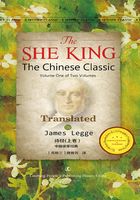
JEH YUEH
1 O sun; O moon,
Which enlighten this lower earth!
Here is this man,
Who treats me not according to the ancient rule.
How can he get his mind settled?
Would he then not regard me?

將=送, 'to escort'. Ch'in lay south from Wei, and therefore we have 於南.
L1. 5,6. We must take 泣 and 涕 together as= 'to weep'; though 泣 is defined as 'the emission of tears without any sound'. 佇=久, 'a long time'.
St. 4. By 仲氏, 'the lady Chung', we are to understand Tae Kwei. She was called 仲, as the 2d of sisters or of cousins, to distinguish her in the family and the harem; and the designation becomes here equivalent to a surname. 只 occurred before, an untranslateable particle, in i. IV., in the middle of a line; here it is at the end. We find it with尺 and 車 at the side, used in the same way, and also interchanged with 旨. 任 has the meaning in the translation. One definition of it is—信於友道, 'sincere in the ways of friendship'. 塞=實, 'really'. Throughout the She, 終, followed by 且, is merely=旣, and may be translated by 'both'. We must not give it the sense of 'over'. By 先君 is intended duke Chwang. Considering all the evils which he had brought on the two ladies, it is matter of astonishment that they should be able to think of him with any feeling but that of detestation. But, according to Chinese ideas, though the husband have failed in every duty, the wife must still cherish his memory with affection.
The rhymes are—in st. 1, 羽, 野*, 雨, cat. 5, t. 2: in 2,頏, 將, cat. 10; 及, 泣, cat. 7, t. 3: in 3, 音, 南*, 心, ib.,t. 1: in 4, 淵, 身, 人, cat. 12, t. 1. 飛, 歸 make a rhymealso in st. 1—3, cat. 15, t. 1.
Ode 4. N arrativ e. CHWANG KEANG COMPLAINS OF AND APPEALS AGAINST THE BAD TREATMENT SHE RECEIVED FROM HER HUSBAND.

2 O sun, O moon,
Which overshadow this lower earth!
Here is this man,
Who will not be friendly with me.
How can he get his mind settled?
Would he then not respond to me?
3 O sun, O moon,
Which come forth from the east!
Here is this man,
With virtuous words, but really not good.
How can he get his mind settled?
Would he then allow me to be forgotten?

Both the old interpreters and Choo give this interpretation of the piece; but the former refer it to the time when she was suffering from the usurpation and oppressive ways of Chow-yu, long after the death of duke Chwang. To this view Choo very properly objects; the individual of whom the piece complains is evidently still alive, and a faint hope is intimated that he would change his course. It is strange that critics like Yen Ts'an should still hold to the opinion of Maou. Choo is also correct in saying that the whole is narrative. There is no allusion, as the old school thinks, in the sun and moon to the marquis and his wife. The suffering lady simply appeals to those heavenly bodies, as if they were taking cognizance of the way in which she was treated. As well might it be said that there is a similar allusion in her appeal to her parents in the last stanza.
L1. 1, 2, in all the stt. 居 and 諸,—see on I.5. I have not translated 臨, but it has its meaning of 'a superior's regarding those below him'. 冒=覆, 'to cover', 'to overshadow'. In stt. 3, 4, the writer is thinking of the sun as it rises daily in the east, and of the moon as it does so when it is full. Obs. how in st. 4 the 自 follows the noun which it governs.
L1.3,4 乃如 must be taken as a compound conjunction, nearly equivalent to our 'but'. 乃 alone has often this meaning, indicating 'a turn in the narrative or discourse (乃, 轉語詞也)'; and Wang Yin-che takes乃如, here and elsewhere, in the same way(乃如, 亦轉語詞也). So, he adds, 乃若 in Mencius,IV. Pt. ii. XXVIII. 7, et al., though the characters are also found at the beginning of paragraphs. 之人,—之=此 or 是, 'this'. 逝 by Choo and Wang Yin-che, is taken as simply an initial particle. This is better than to try, with Maou and Wang T'aou, to explain it by逮 or 及. Instead of 逝 we also find噬 and 遾, used in the same way. Choo acknowledges that he does not understand 古處, but he gives the explanation of some other critic—以古道相處, as in the translation;—which is the best that can be made of it. Chwang Këang was not treated as the ancient rules laid down that a wife should be. In 德音, the 音=言語, 'words'. So, Choo and Yen Ts'an. Wang T'aou prefers to take the phrase in the sense, which it sometimes has, of 令名, 'a good name,or reputation'. In 畜我不卒, 畜=養, 'to nourish'; and 卒=終, 'end', or 'conclusion'.

4 O sun, O moon,
From the east which come forth!
O father, O mother,
There is no sequel to your nourishing of me.
How can he get his mind settled?
Would he then respond to me, contrary to all reason?


